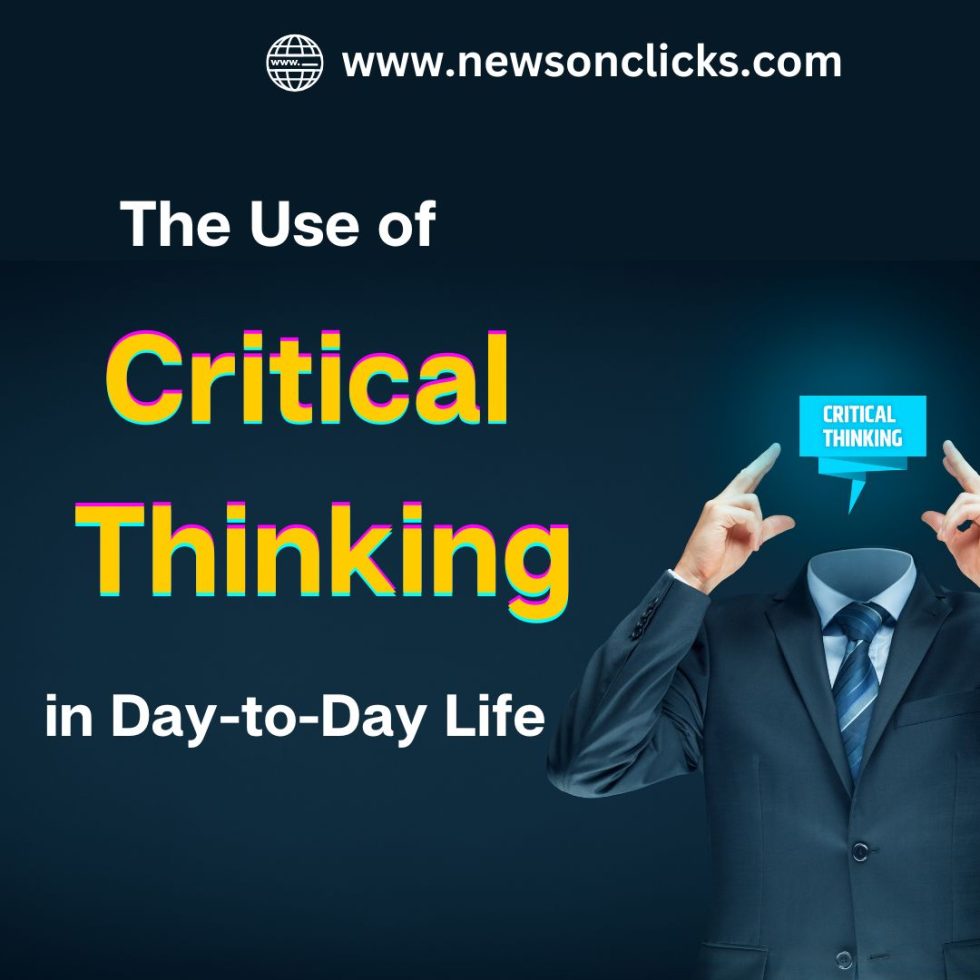
What is Critical Thinking?
To understand what is critical thinking, it is important to first understand what is uncritical thinking. Uncritical thinking is just agreeing with incoming information without challenging the claim. You instantly confirm what is provided without understanding the implications. You simply deal with them when they arrive.
Critical thinking, on the other hand, involves removing oneself from the supplied knowledge and challenging it.
The author, Tom Chatfield, provides two principles that are quite useful for exercising this style of thinking in his book Critical Thinking:
- Scepticism: Scepticism in the form of critical thinking is not believing everything you hear, read, or see. You initially doubt the supplied facts in order to discover the truth.
- Objectivity is the ability to see the true facts without being swayed by your emotions or the emotions of others.
Both of these are important for critical thinking.
The first is giving you a chance to pause and consider, “Is this true? Should I believe this claim?”
While the second is questioning the additional concerns raised by the preceding. We perceive information in ways that support our views and values by default.
For example, suppose a politician promises to renovate the schools in your neighbourhood. Your thoughts might go something like this:
- “Should I put my trust in this claim?”
- “So, why not?” This is fantastic for parents!”
- “I just became a father.” So it’ll be terrific for me as well.”
- “My child will be attending a better school!”
Not that we should accuse the politician of lying right away. But have you seen how the focus has changed to how it will benefit me?
If we dive a little deeper. We might discover that this individual is the owner of a remodelling organisation. This could imply that he can engage his company to do the renovation. Which, as you can probably guess, means more money in his pocket.
What is the Importance of Critical Thinking in Daily Life?
Critical thinking is useful in everyday life because it allows us to analyse the repercussions before making a decision.
After all, what we do with our days is what we do with our lives. And the quality of your life is heavily influenced by the decisions you make.
Almost no day goes by without you having to make decisions that will affect your life in the future.
On a daily basis, you struggle to break undesirable behaviours. Keeping your positive behaviours consistent. Self-regulation and ensuring that you are acting in accordance with your long-term goals. On top of that, you’re always asking yourself, “Should I believe what I just heard or not?”
You will be easily misled by the news flowing if you lack critical thinking. According to social media buzz. Because of the new online shopping tendencies.
All of this is making you more concerned about what’s going on in the world, depressed by all the great on social media, and possibly poorer if you buy items you don’t actually need.
You can preserve your cool by distilling information from the news using critical thinking. You may utilise social media to obtain information rather than worthless likes. Identify buying trends in order to manage a business, not in order to go out of business.
These are only a few of the advantages of critical thinking.
How to Think Critically?
The ability to analyse complicated concepts, simplify them to their essential components, and then “play” different scenarios with these components to see what happens is referred to as critical thinking.
Different situations necessitate a distinct strategy. But if I’m to produce a handbook for critical thinking – which I am, in fact, doing – I’ll go with the following steps:
Questing Incoming Information
Everything that comes your way is a piece of incoming information.
As I mentioned in the start if you’re not thinking critically. Generally, you accept everything – or are influenced by it in some manner.
Critical thinking is demonstrated by how you interact with the notification on your phone.
If you check every notification automatically. Without engaging in critical thinking. You’ll find yourself continually busy yet not getting much done.
In contrast, when you start thinking critically and you get a message. Before you answer, slap the hand about to unlock your phone and ask yourself, “Do I really need to check this or can it wait until I’m finished reading this awesome guide about critical thinking?”
Distinction Between What’s True and What You Want To Be True
When we are provided with information. Or a concept pops into your thoughts and sparks a yearning. You must distinguish between two major components:
- Which section is correct? Is it truly necessary for me to get a new car? Assume you had an idea about purchasing a new car. Is this correct? Do you truly require one? What exactly are the facts? You can indicate here that your present vehicle has lately spent a significant amount of time in the shop for repairs. But you must also look beyond the present. How frequently has your car required repairs in the past?
- What would you like to be true? Your thoughts will naturally direct you toward the things you most desire. You most likely desire the wonderful feelings associated with purchasing a new vehicle. That’s why you only include reasons to buy a new car in the first section. But is this actually the case, or are you just fooling yourself that it is?
Both of these cases must be thoroughly investigated in order to make an appropriate decision.
Create Hypothetical Cases and Explore The Outcomes
You don’t want to be stuck in the “what is true” phase for an entire day. Proceed to this stage once you have the major insights.
Create many hypothetical scenarios to explore what might happen.
Assume you’re considering quitting your work to start an online business.
You’re probably inspired by the current buzz around the Great Resignation movement, often known as the Big Quit. Or you recently read David Graeber’s Bullshit Jobs: A Theory and can no longer see the idiocy of your daily tasks.
To make a decision, you must first investigate the various possibilities.
The main paths in relation to quitting a job are the following:
- Maintain your current job
- Look for another job that is similar.
- Learn new skills and look for new, more meaningful work.
- Quit your job and start your own business.
- Don’t quit, but instead create a side company.
- Find another job while starting a business.
Once we have the primary scenarios, we must investigate them further depending on our existing lifestyle, goals, and ambitions.
You most likely do not have enough time to learn new skills in order to obtain another employment. Or, you have time, but you don’t see the value in learning skills for a new job when you might be developing a skill set that will help you start your own business.
It all boils down to more questions. And each of the possible outcomes must be investigated.
A couple of useful questions to ask yourself for each scenario are:
- What might happen if I were to follow that route?
- How will my daily life change? Can I manage it?
- What would be the worst-case scenario? Is it something I’m willing to put up with?
- What is the ideal scenario? How probable is it to occur?
- What is the most practical option if I ignore my prejudices and emotions and only analyse the facts?
Again, you must maintain a neutral position during all of this questioning. Yes, consider your aims and desires. But don’t let them impair your judgement.
Starting a business and bragging about it online certainly sounds more glamorous. But if you start something just for the purpose of receiving external affirmation, you won’t get very far. To overcome difficulties and progress beyond the Plateau of Latent Potential, you must have inner motivation.
Some Final Thoughts
Let me think about it. That is the essence of critical thinking. Then there’s the actual thinking about it.
The more you practice critical thinking, the less likely you are to say things like, “Oh, I didn’t think about that.”
All of this does not imply that you will always make the right decision – or that you will become the god of decision-making. However, odds are you’ll make better decisions than usual.
You’ll start asking more questions, anticipating what can happen, and making fewer mistakes as a result.
A negative side effect of becoming a critical thinker is becoming someone who is constantly opposed to what others think. Not because you want to dispute with them, but because others rarely use their critical thinking skills and instead fall victim to groupthink and one of the obstacles to critical thinking is groupthink.









